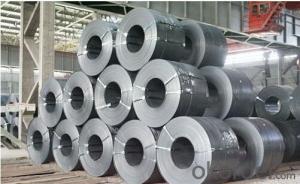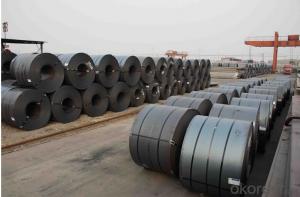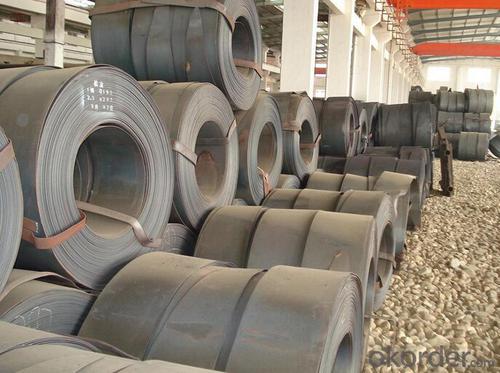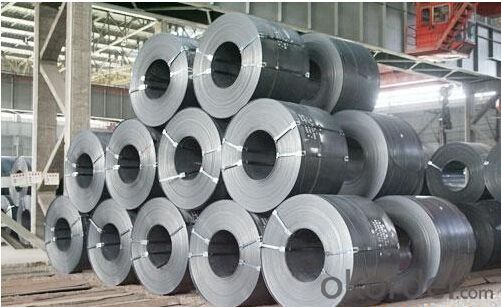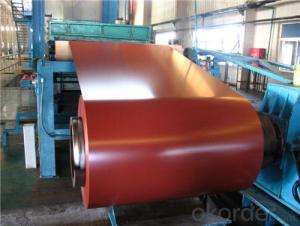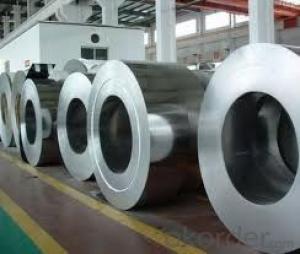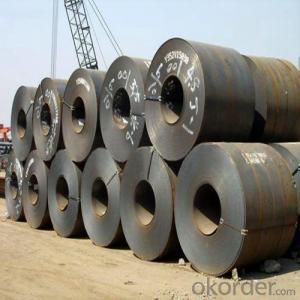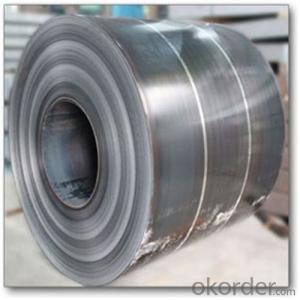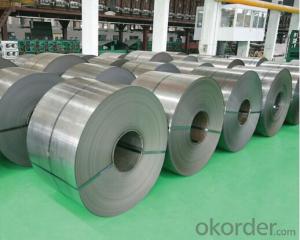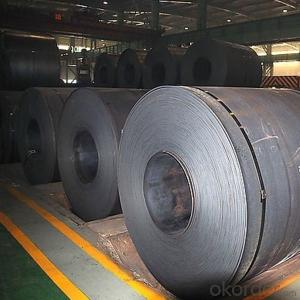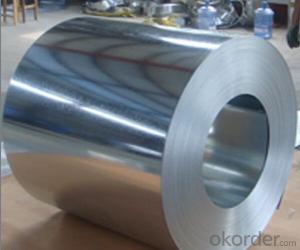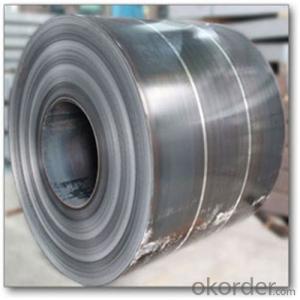Hot Rolled Steel Coil GB Standard in High Quality
- Loading Port:
- Tianjin
- Payment Terms:
- TT or LC
- Min Order Qty:
- 100 m.t.
- Supply Capability:
- 100000 m.t./month
OKorder Service Pledge
OKorder Financial Service
You Might Also Like
OKorder is offering Hot Rolled Steel Coil GB Standard in High Quality at great prices with worldwide shipping. Our supplier is a world-class manufacturer of steel, with our products utilized the world over. OKorder annually supplies products to African, South American and Asian markets. We provide quotations within 24 hours of receiving an inquiry and guarantee competitive prices.
Product Applications:
Hot Rolled Steel Coil GB Standard in High Quality are ideal for structural applications and are widely used as raw material for: Container &Pipe Production, Carbon Structural Steel, Low Alloy Steel, High Quality Carbon Structural Steel, Atmospheric Corrosion Resistant Steel, Low Carbon Steel (Commercial Quality, Drawing Quality, Deep Drawing Quality) .
Product Advantages:
OKorder's Hot Rolled Steel Coil GB Standard in High Quality are durable, strong, and wide variety of sizes.
Main Product Features:
· Premium quality
· Prompt delivery & seaworthy packing (30 days after receiving deposit)
· Can be recycled and reused
· Mill test certification
· Professional Service
· Competitive pricing
Product Specifications:
1. Thickness 14mm - 60mm
2. Width 1800mm - 2500mm
3. Sheets Length 6000mm - 12000mm
4. Internal Diameter 508mm or 610mm
5. Steel Grade Q235B, Q235C, Q235D, Q345B, SPHC 510L, Q345A, Q345E, SS400, Q345G, Q345F
6. FOB 620-720USD per ton
7. Standard ASTM
8. Rolling Precision A/B
9. Edge Q/BQ
Technical Information of Hot Rolled Steel Coil
Chemical Composition
C | Si | Mn | P | S |
0.04-0.05% | 0.01-0.02% | 0.18-0.22% | 0.014-0.016% | 0.006%-0.009% |
Technical Data
1. Yield Strength (Mpa) 280-320
2. Tensile Strength (Mpa) 340-390
3. Elongation 23%-41%
4. Reverse Impact 9J
5. T-bending ≥2T
6. Pencil Hardness ≥2H
7. Duration Of Salt Spray Test 500 H
8. Bending At 180 Degree No crack, purling and fraction
FAQ:
Q1: Why buy Materials & Equipment from OKorder.com?
A1: All products offered byOKorder.com are carefully selected from China's most reliable manufacturing enterprises. Through its ISO certifications, OKorder.com adheres to the highest standards and a commitment to supply chain safety and customer satisfaction.
Q2: How do we guarantee the quality of our products?
A2: We have established an advanced quality management system which conducts strict quality tests at every step, from raw materials to the final product. At the same time, we provide extensive follow-up service assurances as required.
Q3: How soon can we receive the product after purchase?
A3: Within three days of placing an order, we will arrange production. The normal sizes with the normal grade can be produced within one month. The specific shipping date is dependent upon international and government factors, the delivery to international main port about 45-60days.
Images:
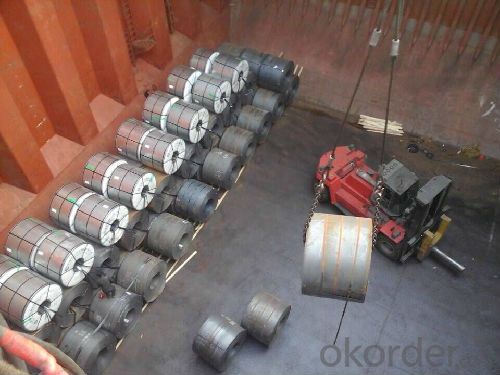
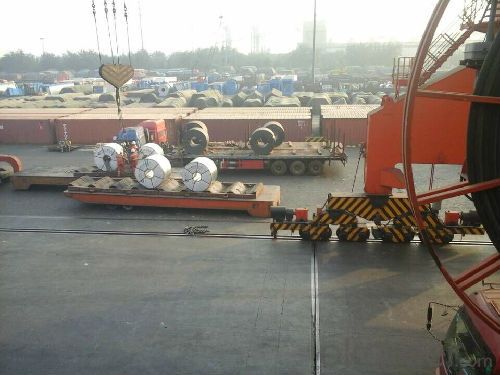
- Q: What are the benefits of using coated steel coils in roofing applications?
- There are several benefits of using coated steel coils in roofing applications. Firstly, coated steel coils are highly durable and provide excellent resistance against corrosion. The coatings applied to the steel coils act as a barrier, protecting the underlying metal from exposure to moisture, chemicals, and harsh weather conditions. This ensures that the roofing system remains intact and functional for an extended period, reducing the need for frequent repairs or replacements. Secondly, coated steel coils offer superior strength and structural integrity. Steel is known for its high tensile strength, and when combined with the protective coating, it becomes even more resilient. This makes coated steel coils an ideal choice for roofing applications, as they can withstand heavy loads, extreme temperatures, and strong winds without compromising the integrity of the structure. Additionally, coated steel coils are lightweight, which makes them easier to handle and install. This not only saves time and effort during the roofing process but also reduces the overall weight of the structure, minimizing the stress on the building's foundation. Furthermore, coated steel coils are available in a variety of colors and finishes, allowing for greater design flexibility. Architects and homeowners can choose from a wide range of options to complement the overall aesthetics of the building. The coatings also provide enhanced UV resistance, preventing color fading and ensuring that the roofing system maintains its appearance over time. Lastly, using coated steel coils in roofing applications is an environmentally friendly choice. Steel is a highly recyclable material, and the coatings used on the coils can be formulated to be environmentally friendly as well. This helps reduce the carbon footprint associated with construction and promotes sustainability. In conclusion, the benefits of using coated steel coils in roofing applications include durability, strength, lightweight, design flexibility, and environmental sustainability. These advantages make coated steel coils a reliable and cost-effective choice for any roofing project.
- Q: I installed it, added it in F3 launcher and then after one minute of walking in wasteland I get a signal that Broken steel was added and that my level of caps was raised by 30. However after this message no quest is added. I played all 4 exp. packs and I had no problem at all, each time a new quest was added. So whats up with this Broken steel. Btw, I completed the entire game F3.
- Broken Steel doesn't begin until the main quest ends.
- Q: How are steel coils inspected for surface defects after processing?
- Steel coils are inspected for surface defects after processing using various methods such as visual inspection, magnetic particle inspection, dye penetrant inspection, and ultrasonic testing. These techniques help identify any irregularities or defects on the surface of the coils, ensuring the quality and integrity of the final product.
- Q: I'm pretty sure that this topic has been beaten to death by now. But, I still can't get a definite answer. With stainless steel, you get better corrosion resistance, and you will hold and edge longer. With carbon steel, you will hold a sharper edge, and you could forge a knife blade longer than 2 ft without breakage. I'm personally a fan of stainless steel ( the 440 grade stuff ), just because it seems to hold up to use and abuse better in the long run. HOWEVER, I have NEVER had a factory made knife break on me. I don't think that they would try to sell you a knife that didn't do what it was meant to do, at least to a reasonable degree. (I work for a living, and can't afford a custom $600 knife.) What do you think? Is this a pointless topic? Will there ever be a winner?
- You didn't say WHICH type of stainless steel, which will make all the difference. There are $2 stainless steel knives and $200 stainless steel knives. The best stainless knife steels will rival the best high carbon steels when it comes to edge-holding properties. These days MOST of the best knives on the market are made from premium stainless steels because of the lower maintenance, but a high carbon steel knife has classic appeal and great edge-holding properties.
- Q: I am thinking of buying a stainless steel necklace, but I need to know if it will discolor. My brothers ring turned brown, but he forgot what kind of metal it was. Also answer if I can wear it in the shower because I wear my other necklace in it.
- I would say don't wear it in the shower because it will tarnish and it could rust.
- Q: What are the different types of steel coil finishing tools?
- There are several different types of steel coil finishing tools used in the metalworking industry. These tools are designed to add various finishes to steel coils, enhancing their appearance and functionality. Some of the common types of steel coil finishing tools include: 1. Slitting Machines: These tools are used to cut large steel coils into narrower strips. Slitting machines have sharp circular blades that can efficiently slice through the coil, resulting in multiple smaller coils of desired widths. 2. Levellers: Levellers are used to flatten and straighten steel coils. They apply pressure to the coil, ensuring that it is perfectly flat and even. Levellers are particularly useful when the steel coils have undergone deformation during the manufacturing process. 3. Recoilers: Recoilers are used to rewind steel coils into a tighter and more compact shape. These tools are typically used after slitting or levelling to create coils of a specific diameter or size. 4. Edge Trimmers: Edge trimmers are used to remove any excess or uneven edges from the steel coils. They can remove burrs, rough edges, or any other imperfections, resulting in a clean and smooth finish. 5. Inspection Machines: Inspection machines are used to examine the quality of the steel coils. These tools can detect any defects, such as surface imperfections, scratches, or dents, ensuring that only high-quality coils are delivered to customers. 6. Coating Machines: Coating machines are used to apply protective coatings to steel coils. These coatings can be in the form of paint, zinc, or other materials, preventing corrosion and enhancing the durability of the coils. 7. Packaging Machines: Packaging machines are used to wrap the steel coils securely and protect them during transportation and storage. These machines can apply plastic or metal straps, shrink wrap, or other packaging materials to ensure the coils remain intact and undamaged. Overall, these different types of steel coil finishing tools play a vital role in the metalworking industry, allowing manufacturers to produce high-quality and visually appealing steel coils that meet the specific requirements of their customers.
- Q: Can steel coils be coated with anti-tampering materials?
- Yes, steel coils can be coated with anti-tampering materials. These materials are commonly applied to steel coils to prevent unauthorized access or tampering, ensuring the integrity and security of the contents within the coils.
- Q: Are steel coils affected by temperature changes?
- Yes, steel coils are affected by temperature changes. Steel is a metallic material that expands when heated and contracts when cooled. Temperature fluctuations can cause steel coils to expand or contract, which may impact their dimensions, mechanical properties, and overall performance. It is important to consider and manage temperature changes to ensure the proper functioning and durability of steel coils.
- Q: How are steel coils used in the manufacturing of fuel systems?
- Steel coils are commonly used in the manufacturing of fuel systems to create various components such as fuel tanks, pipes, and fittings. These coils are often shaped, cut, and welded to form the desired fuel system parts. The high strength and durability of steel make it an ideal material for fuel systems, ensuring the safe and efficient transportation of fuel.
- Q: What are the different types of steel coil handling devices?
- There are several types of steel coil handling devices, including coil lifters, coil grabs, coil tongs, coil hooks, and coil transfer cars.
Send your message to us
Hot Rolled Steel Coil GB Standard in High Quality
- Loading Port:
- Tianjin
- Payment Terms:
- TT or LC
- Min Order Qty:
- 100 m.t.
- Supply Capability:
- 100000 m.t./month
OKorder Service Pledge
OKorder Financial Service
Similar products
Hot products
Hot Searches
Related keywords

